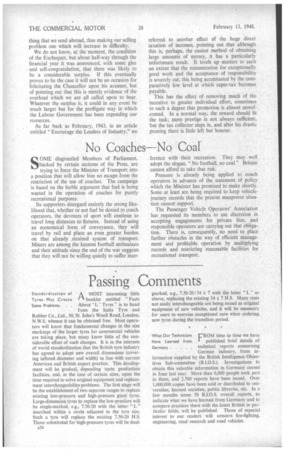No Coaches—No Coal
Page 26

If you've noticed an error in this article please click here to report it so we can fix it.
SOME disgruntled Members of Parliament, backed by certain sections of the Press, are trying to force the Minister of Transport into a position that will allow him no escape from the restriction of the use of coaches. The campaign is based on the feeble argument that fuel is being wasted in the operation of coaches for purely recreational purposes.
Its supporters disregard entirely the strong likelihood that, whether or not fuel be denied to coach operators, the devotees of sport will continue to travel long distances to fixtures. Instead of using an economical form of conveyance, they will travel by rail and place an even greater burden on that already ,strained system of transport. Miners are among the keenest football enthusiasts and their attitude since the end of the war suggests that they will not be willing quietly to suffer inter ference with their recreation. They may well adopt the slogan, "No football, no coal." Britain cannot afford to take that risk.
Pressure is already being applied to coach operators in advance of the statement of policy which the Minister has promised to make shortly. Some at least are being required to keep vehiclejourney records that the present manpower situation cannot support.
The Passenger Vehicle Operators' Association has requested its members to use discretion in accepting engagements for private hire, and responsible operators are carrying out that obligation. There is, consequently, no need to place further obstacles in the way of efficient management and profitable operation by multiplying records and restricting reasonable facilities for recreational transport.




















































































